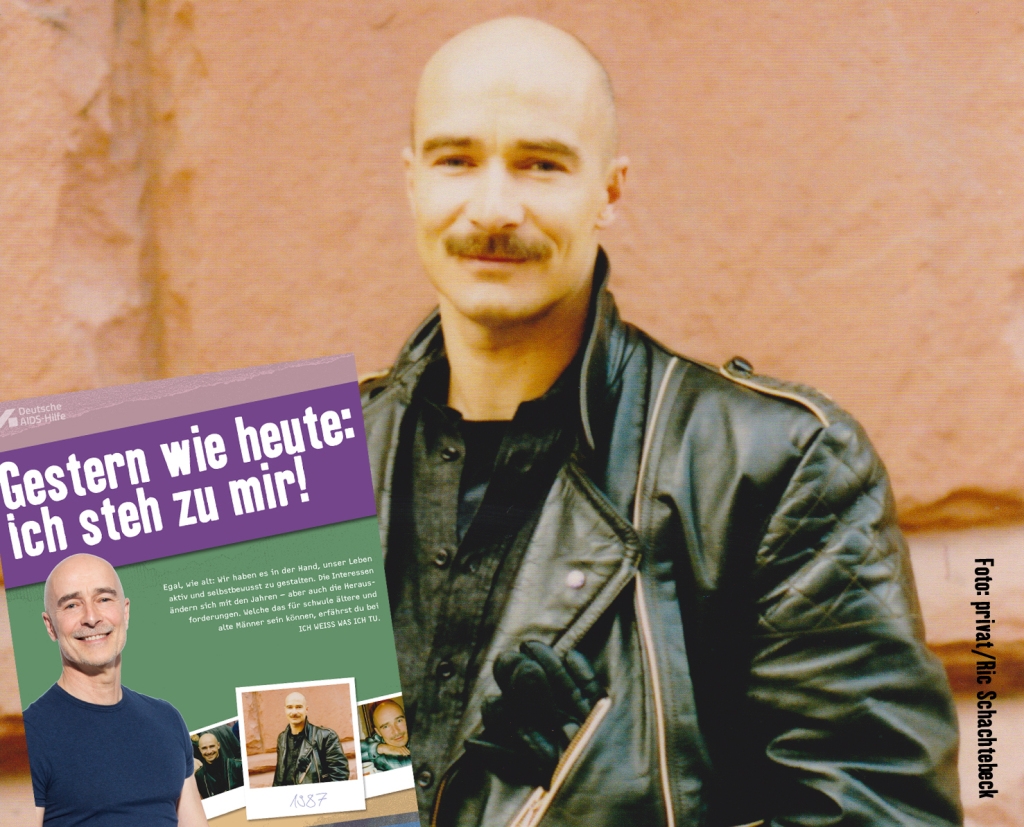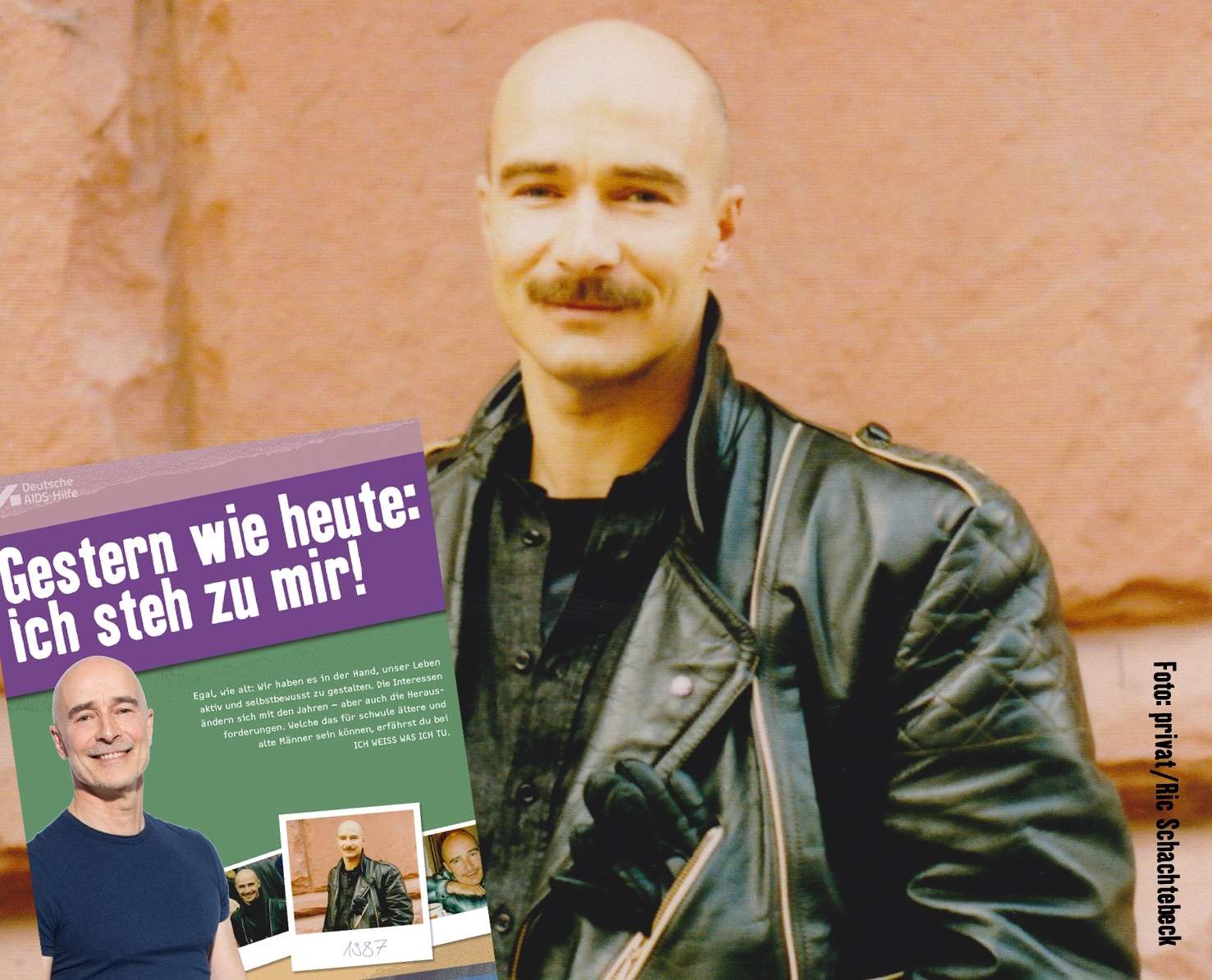Ric Schachtebeck has always lived an intense life: in the 1970s he moved from Berlin to New York, then Amsterdam and finally - back home again - Ric became an AIDS activist. In the mid-1980s, he had himself photographed for a poster for a prevention campaign by Deutsche AIDS-Hilfe, which became the epitome of safer sex awareness both inside and outside the gay community for years. But even today, the now 63-year-old has not become a bit quieter.
Ric, how did you experience the beginning of the Aids crisis?
That was in 1983, when I was living in Amsterdam. American friends told me about a deadly "gay disease" that had been discovered in the USA. At first I thought it was an absurd rumour, but as the number of deaths rose, I got scared. Almost more frightening than the disease itself, however, were the stereotype-laden, homophobic statements made by politicians and doctors. They made it irrevocably clear how shaky our newly won rights and sexual freedoms were and how deep-seated the prejudices still were. In the USA and Holland, self-help groups with their own publications were formed as a result.
You came in 1984 back to theück to Berlin. Was the Aids debate just as popular here?ülike in the USA or Amsterdam?
No, not at all. While the majority of gays in New York and Amsterdam had already started to take matters into their own hands and organise themselves, people in Berlin were still living by the motto: if you don't go to bed with a Yank, then you can't get infected. That was incredibly naive, dangerous and ignorant and made it clear how panicked and helpless people were and, above all, how passive they were in the face of the situation. At the time, I felt safer and better off in New York, where people were informed about AIDS and some were already affected. That's why I kept in close contact with the Gay Men's Health Centre right from the start and when they called for "safe sex", I only fucked with a rubber. In Berlin, I was one of the few at the beginning and often had to justify myself to my sex buddies, as many still found my attitude hysterical and exaggerated at the time. That changed with the first visibly infected people and AIDS deaths.
In 1986 you have füposed for a safer sex poster from Deutsche AIDS-Hilfe. How did this come about?
I had worked with a group from which the Berlin AIDS organisation emerged and was otherwise quite present in the scene. And when Detlev Pusch was commissioned by Deutsche AIDS-Hilfe to photograph several motifs for their own poster series, he asked me if I would pose for one. Of course, I immediately said yes.
And then you became a bit of a star, didn't you? The poster became üeverywhereäThere was even a party in New York...
Well (laughs). The poster was very successful because it appealed to a wide variety of people and was also often used in the press. And yes, it's true: for a while I couldn't leave the house, regardless of the city, without being approached about the poster. I usually ended up in a prevention talk about safer sex. That was part of the campaign and also helped me to come to terms with the topic. The message: "You can stop the virus. I use condoms" was given a personal face for the people I spoke to and for some I certainly became a kind of role model. Even today, there are still people who remember the poster and talk to me about it. And in New York, the poster hung in the Gay Men's Health Centre, and when I was there again, some of the staff were very proud of me and threw a little party.
WüWould you say that your sex became different because of the AIDS issue?
Of course. Switching your head on during sex is stupid and of course you have to get used to condoms, which were invented for straight men. I don't think you should talk yourself into having safer sex, as people tried to do in the beginning, but accept it as a fact of life and practise it and integrate it into your sex life. However, what I really like about safer sex is the gesture: by using condoms you are signalling mutual respect and responsibility. That alone creates an atmosphere of intimacy and trust: good conditions for a hot number!
In your opinion, what has changed since the 80s?äWhat has changed and whatäDoes it bother you today when you think about HIV and Aids?
By now, everyone has probably realised that condoms protect against HIV and other sexually transmitted diseases. This is precisely why I find the development so alarming that people are once again increasingly having unprotected sex. According to the magazine "Der Spiegel", the infection rate has risen again. How can that be? I wonder why so many men, especially young men, are so naive and blinded by the topic of HIV. Are they not sufficiently informed about what it means to make their lives dependent on HIV tablets and to struggle with side effects? When I see so many men in the nightlife and at sex parties who are extremely self-centred, careless and irresponsible with each other, it's hard for me to digest. It makes me angry and sad at the same time. Because the fact is: HIV is still not curable today.
(Editor's addition: According to the Robert Koch Institute (RKI), an increase in the HIV infection rate has been observed since around 2000; since 2006, the figures have remained stable at a relatively low level. According to the RKI, most new HIV infections in men are detected in the 25-29 age group. This is followed at some distance by the 30 - 34 age group and then the 35 - 39 age group).











